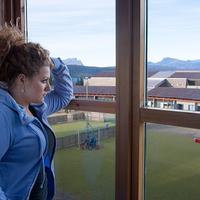3B: Boyanas hybel
|Boyana's apartment|Boyana's apartment
|Boyanas kamer|kamer van
|Boyanas|kawalerka
||bérlemény
3B: Boyanas Schlafsaal
3B: Boyana's dormitory
3B: dormitorio de Boyana
3B : le dortoir de Boyana
3B: dormitorio di Boyana
3B:ボヤナ寮
3B: Boyanos bendrabutis
3B: de slaapzaal van Boyana
https://www.ntnu.edu/nowin/3/boyana
3B: Akademik Boyany
3Б: Общежитие Бояны
3B: Boyanas sovsal
3Б: Гуртожиток Бояна
Boyana går ut av minibussen på Jaklamyra studentby.
||||minibus|||
||out of|of|the minibus|to|Jaklamyra student village|student village
||||de minibus||Jaklamyra studenten|studentenhuis
|||||||residencia estudiantil
Boyana steigt in der Studentenstadt Jaklamyra aus dem Kleinbus.
Boyana gets out of the minibus at Jaklamyra student town.
Boyana sort du minibus à Jaklamyra studentby.
Boyana wysiada z minibusa w studenckim miasteczku Jaklamyra.
Hun finner hus 2 og går inn.
|finds|house|||in
|talál||||
Sie findet Haus 2 und geht hinein.
She finds house 2 and goes inside.
Elle trouve la maison 2 et entre.
Znajduje dom 2 i wchodzi do środka.
På hybelen finner hun kontrakt, informasjon og kart over Narvik.
||||contrat|||||
|the apartment|finds||contract|information||map of Narvik|of|
||||contract|||||
||znajduje||umowa|informacja||||
|||||||||Narvik
Im Wohnheim findet sie einen Vertrag, Informationen und eine Karte von Narvik.
In the dormitory, she finds a contract, information and a map of Narvik.
Dans sa chambre, elle trouve un contrat, des informations et une carte de Narvik.
W akademiku znajduje umowę, informacje oraz mapę Narwiku.
Boyana bærer inn tre poser, to kofferter og ei veske til hus 2.
|porte||||||||||
|carries||three|bags||suitcases|||handbag||
|brengt|||tassen||koffers|||handtas||huis
||||torby|||||torba||
|lleva||||||||||
Boyana bringt drei Taschen, zwei Koffer und eine Tasche zu Haus 2.
Boyana brings in three bags, two suitcases and a bag to house 2.
Boyana porte trois sacs, deux valises et un sac à main dans la maison 2.
Boyana przynosi do domu 2 trzy torby, dwie walizki i torbę.
Boyana går først inn på kjøkkenet.
|||||cuisine
Boyana|goes|first|||the kitchen
|||||de keuken
||najpierw|||
||primero|||
Boyana goes into the kitchen first.
Boyana entre d'abord dans la cuisine.
Boyana pierwsza idzie do kuchni.
Hun skal dele det med en annen student.
||partager|||||
|will|share|it|||another|
||delen|||||
||||||otro|
||podzielić||||innym|
Sie wird es mit einem anderen Schüler teilen.
She will share it with another student.
Elle doit le partager avec un autre étudiant.
Podzieli się nim z innym uczniem.
Hybelen ligger ved siden av kjøkkenet.
|||de||
The studio apartment|is located|next to|next to|"next to"|
Der Schlafsaal liegt neben der Küche.
The dorm is beside the kitchen.
La chambre est située à côté de la cuisine.
Akademik jest obok kuchni.
Спальня рядом с кухней.
Den er ikke stor.
|||grande
it|||big
It is not big.
Elle n'est pas grande.
To nie jest duże.
Den har ei brun seng, et brunt bord og et skap.
||||||brun||||
|||brown|bed||brown|table|||cabinet
||||||||||szafa
||||||marrón||||
It has a brown bed, a brown table and a cupboard.
Elle a un lit brun, une table brune et une armoire.
Ma brązowe łóżko, brązowy stół i szafkę.
里面有一张棕色的床、一张棕色的桌子和一个橱柜。
Ei høy bokhylle står ved siden av døra.
|||||||la porte
a|tall|tall bookshelf|stands|next to|beside|of|the door
|hoge|boekenplank|||||
Neben der Tür steht ein hohes Bücherregal.
A tall bookcase stands next to the door.
Obok drzwi stoi wysoki regał.
Under vinduet står et skrivebord.
||||bureau
|the window|is standing|a|desk
||||bureau
||||biurko
Under the window is a desk.
Pod oknem jest biurko.
Det er stort.
||grand
it||It is big.
It is big.
To jest duże.
Gardinene er fæle.
les rideaux||
The curtains||The curtains are awful.
de gordijnen||lelijk
||feas
zasłony||brzydkie
The curtains are horrible.
Les rideaux sont horribles.
Zasłony są okropne.
窗帘太可怕了。
Her skal hun bo i ett år.
|||vivre|||
Here||she|live||one|one year
||||||jaar
Sie wird ein Jahr hier leben.
She will live here for a year.
Elle va vivre ici pendant un an.
Spędzi tu rok.
Hun setter veska på bordet og legger koffertene under senga.
||||table|||||
|puts|the bag||the table||puts|the suitcases|under|the bed
She puts her bag on the table and puts the suitcases under the bed.
Elle pose son sac sur la table et met les valises sous le lit.
Kładzie torbę na stole i kładzie walizki pod łóżkiem.
I posene finner hun sjokolade og te.
|les sacs|||||thé
|the bags|"finds"|she|chocolate||tea
|torbach|znajduje||||
In the bags she finds chocolate and tea.
Dans le sac, elle trouve du chocolat et du thé.
W torebkach znajduje czekoladę i herbatę.
Gjennom vinduet ser hun en stor parkeringsplass.
à travers||||||parking (place)
Through|the window|sees|||large|parking lot
||||||parkeerplaats
Through the window she sees a large parking lot.
À travers la fenêtre, elle voit un grand parking.
Przez okno widzi duży parking.
Det er stille her.
||silencieux|
||It is quiet.|here
Hier ist es ruhig.
It's quiet here.
Il fait calme ici.
Tu jest cicho.
Hjemme i Burgas er det aldri stille.
||||||silencieux
At home||Burgas|||never|quiet
||||||silencio
|||||nigdy|cicho
At home in Burgas it is never quiet.
À la maison à Burgas, il n'y a jamais de calme.
W domu w Burgas nigdy nie jest cicho.
Дома в Бургасе никогда не бывает тихо.
Hva gjør mor og far nå?
||||père|
|are doing|mother||father|
||||vader|
|robią|mama|||
Was machen Mama und Papa jetzt?
What are mom and dad doing now?
Que font maman et papa maintenant ?
Co teraz robią mama i tata?
Og Ivan, tenker han på henne?
|Ivan||||
|And Ivan|thinking about|||her
Und Ivan, denkt er an sie?
And Ivan, is he thinking about her?
Et Ivan, pense-t-il à elle ?
A Ivan, czy on o niej myśli?

